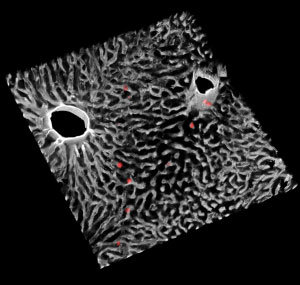María Crespo, Barbara Gonzalez-Teran, Ivana Nikolic, Alfonso Mora, Cintia Folgueira, Elena Rodríguez, Luis Leiva-Vega, Aránzazu Pintor-Chocano, Macarena Fernández-Chacón, Irene Ruiz-Garrido, Beatriz Cicuéndez, Antonia Tomás-Loba, Noelia A-Gonzalez, Ainoa Caballero-Molano, Daniel Beiroa, Lourdes Hernández-Cosido, Jorge L Torres, Norman J Kennedy, Roger J Davis, Rui Benedito, Miguel Marcos, Ruben Nogueiras, Andrés Hidalgo, Nuria Matesanz, Magdalena Leiva & Guadalupe Sabio.
Liver metabolism follows diurnal fluctuations through the modulation of molecular clock genes. Disruption of this molecular clock can result in metabolic disease but its potential regulation by immune cells remains unexplored.

Here, we demonstrated that in steady state, neutrophils infiltrated the mouse liver following a circadian pattern and regulated hepatocyte clock-genes by neutrophil elastase (NE) secretion. NE signals through c-Jun NH2-terminal kinase (JNK) inhibiting fibroblast growth factor 21 (FGF21) and activating Bmal1 expression in the hepatocyte. Interestingly, mice with neutropenia, defective neutrophil infiltration or lacking elastase were protected against steatosis correlating with lower JNK activation, reduced Bmal1 and increased FGF21 expression, together with decreased lipogenesis in the liver. Lastly, using a cohort of human samples we found a direct correlation between JNK activation, NE levels and Bmal1 expression in the liver.
This study demonstrates that neutrophils contribute to the maintenance of daily hepatic homeostasis through the regulation of the NE/JNK/Bmal1 axis.





0 Comments
1 Pingback